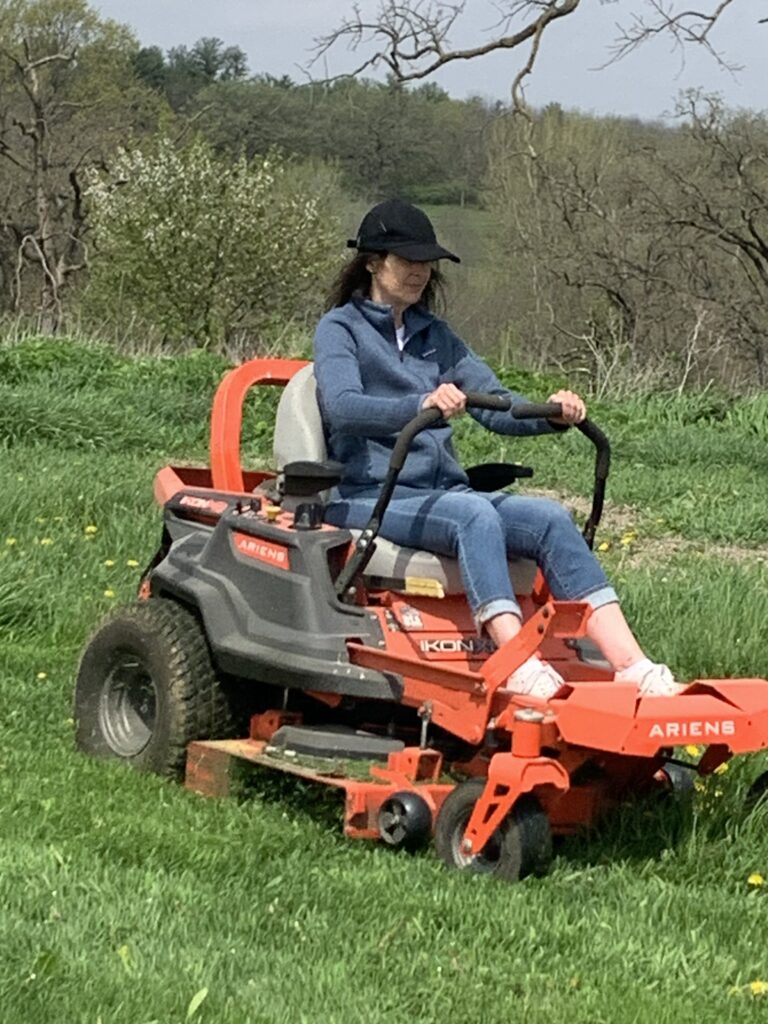In Partnership with Nature: Interview with Farmer Holly Reichert

Today, 1.2 million farmers, more than a third of all US agricultural producers, are women. Women farmers find their relationship with the land to be intimate, precious and healing. The increasing number of women in farming is partially due to their desire for a healthier and more sustainable life. Naturally, women find fulfillment in watching things grow and nurturing them. Holly Reichert is one of these women, tending to 5.5 acres in Iowa. We spoke to her, between cultivating and harvesting, one day in July.
Q: Thanks for speaking with us, Holly. First, what was your background before choosing farming as your occupation?
A: I was a public high school English teacher and school/district administrator.
Q: What inspired you to become a farmer?
A: I have a desire to work with nature, be in nature, learn from nature and share that with others through producing food. I love creating and sustaining a beautiful place for people to come and experience nature and the growing of food.
Q: Can you describe your experience of farming and explain perennial crops?
A: I am new to farming and am also in a five-month regenerative organic agriculture certificate program, so I’m learning both theory and practice as I work. I had bought an established farm that has perennial crops.
Perennial crops are plants that live for more than two years, often producing harvests for multiple years without needing to be replanted each season. Unlike annuals, which complete their life cycle in a single year, perennials have a longer lifespan and can be harvested repeatedly. They include fruit trees, nut trees, some vegetables, and herbs.
Common examples of perennial crops include apples, grapes, strawberries, almonds, walnuts, asparagus, rhubarb, and many herbs. Perennial crops are important—they require less tilling, planting, and potentially less pesticide and fertilizer use. They can help with soil conservation, erosion control, and water infiltration, so perennial agriculture can reduce the environmental impact of farming.
Q: What were your first crops?
A: My first experience was this Spring, harvesting asparagus and sour cherries. And I now have a great crop of peaches!
Q: What’s keeping you busiest?
A: I’ve been busy recently preparing the farm for next year’s market crops and expanding the current perennial footprint: getting rid of old items; cleaning everything; clearing dead trees, overgrowth and invasive species; renovating the greenhouse. I’m putting in infrastructure: a road, electricity, water…. It’s a big job!
Q: What strengths do you have that are foundational to your work as a female farmer?
A: I am methodical, organized, observant, and want to be involved in every aspect of the farm. I am able to delegate, provide feedback, and ask for input. I enjoy collaboration and rely on people with specific skills and expertise to support me and the farm.

Q: Does your twice daily practice of the Transcendental Meditation technique support your strengths and reduce your weaknesses as a farmer?
A: TM allows me to stay centered and focused on the tasks at hand. TM gives me energy and helps put in long days of hard and sometimes stressful work. I feel grounded and ready each day to take on whatever is before me: such as unpredictable weather, farm equipment breaking down, and workers not showing up. After coming home, TM provides the rest and rejuvenation
I need to enjoy my evening.
Q: What do you find most challenging about the work?
A: Being new to farming,everything is new. I have had some very overwhelming days, but being able to slow down and come back to myself through TM has been a game changer.
Q: How do you see the future of farming evolving and do you think that other farmers, especially women, would profit from adding the TM technique to their routine?
A: Small farms that support local communities with healthy, regeneratively and organically grown food are key to everyone’s well-being and the well-being of our soil, ecosystems, and planet. Meditating allows me to self-manage and I believe I will be able to manage the challenges of farming in a more centered and holistic way. I assume it would support all women farmers in this same way.
Q: Final comments?
A: TM is helping me run the farm as opposed to the farm running me. I am in partnership with nature to successfully create a healthy environment for growing delicious food and nourishing myself, those who work with me, and my community.
Get to the root of life: contact a certified TM teacher
About the Author
Janet Hoffman is the executive director of TM for Women Professionals, a division of TM for Women in the USA
More Posts by Janet
- A Simple Guide to Healthy Happy Mothers and Babies: An Interview with Author Margaret Mullins
- Author Ann Purcell Discusses Silence
- Five Fundamentals of Progress: A Scientific Path to Self-Improvement
- Advice You Can Rely On: How to Leverage Your Body’s Innate Healing Ability
- Saving the Ocean from Deadly Noise Pollution: An Interview with Kathy Matara PhD





